Importance of Mosquito Bite Prevention: 5 Essential Oils That Naturally Repel Insects
Essential oils are truly essential for our health. Used since ancient times, every civilization practised various forms of healing of both the body and soul with tinctures containing the essence of each plant they are made of. But besides being great for our overall health and well-being, another truly convenient advantage of essential oils is the pest control property some of them possess.
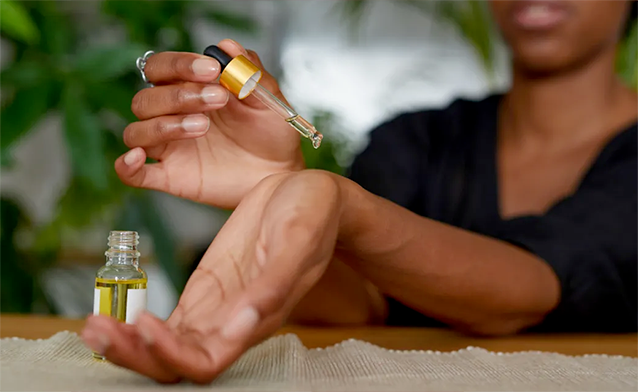
Essential Oils – Natural and Safe Insect Repellents
The ability to cause biotransformation (trigger undesirable hazardous interactions with biological systems) and bioaccumulation (piling up of undesired toxic chemicals within biological systems) is what makes insect repellents dangerous. Their effects are dose-dependent and the most common unintentional routes of exposure are the ocular and nasal routes.
One of the most commonly used insect repellents is N, N-diethyl-3-methylbenzamide (DEET) that can cause local irritation and discomfort locally in the eyes or oral cavity while ingestion has been shown to cause nausea, vomiting, hypotension, encephalopathy and even seizures and coma.
In addition to the strong case against commercial insect repellents, evidence of the efficiency is piling up in favour of natural oils that repel mosquitoes. In fact, multiple studies have investigated their effect by measuring the repellence time (how long is the essential oil functional after applying it) and biting percentage (how many landings resulted in biting).
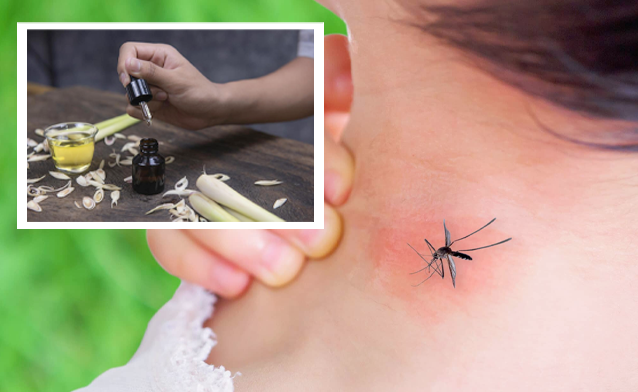
What these studies have shown is that essential oils will have optimal efficiency if the protection time is long and the percentage of biting is low. However, if the protection time is short but the percentage of biting is still low, the oil is more of a feeding deterrent than a repellent. Finally, if the protection time is long but the biting rate is high that compound can be classified as a repellent, not a feeding deterrent.
In any case, more than a few essential oils excel as natural insect repellents or feeding deterrents. However, their protection times are still lower than those of man-made chemical insect repellents. Even so, the toxicity of essential oils is close to 0 when compared to industrial repellents. In addition, you can reap many other health benefits. Here’s which essential oils will not only protect your skin from insect bites but will also pamper other parts of your mind and body.
The Best Essential Oils to Keep Annoying Mosquitos Away
Lemon Myrtle
Lemon Myrtle tree or Backhousia Citriodora is a plant native to Australia and its benefits were well known to the Aborigines long before Australia began exporting it to the US and EU where it’s used as a speciality tea. The leaves are typically dried and milled used as a tea or flavour ingredient or steam distilled to obtain lemon myrtle essential oil.
What can lemon myrtle be used for? The milled leaves are often used to impart a distinctively clean and crisp citrus flavour in teas, drinks, condiments, biscuits and cakes or as a substitute to lemongrass in cooking. Lemon myrtle essential oil is used as an ingredient in cosmetics like soaps, creams, toothpaste and shampoos, conditioners and as therapeutic aromatherapy products. Most importantly, it’s been used as an insect repellent.
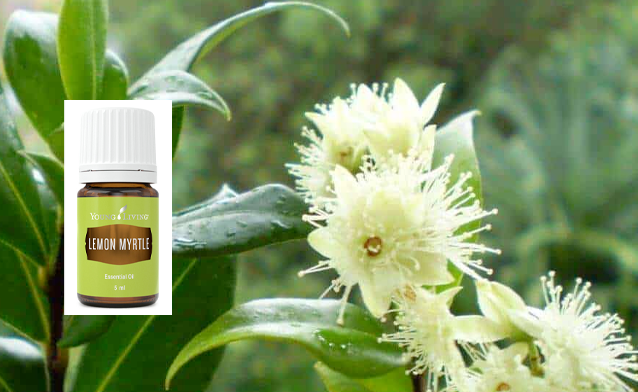
How does lemon myrtle repel mosquitoes though? It contains the highest amount of citral (>90%) of any known plant, making it one of the best natural oils that repel mosquitoes. Not only is this compound a key player in the fight against pests but it’s also what gives lemon myrtle refreshingly intense citrus notes. Due to the flavour and aroma, lemon myrtle has been described as lemonier than lemon.
Female mosquitoes use host odours to find their hosts. This host-seeking behaviour is influenced and directed by a combination of lactic acid, CO2, ammonia, and several fatty acids that all warm-blooded vertebrate animals release. In addition to geraniol and linalool, citral is one of the plant compounds that may induce changes in smell-driven (olfactory) responses of the female mosquito Aegyptus Albopictus. This makes citral and lemon myrtle could be great for developing spatial repellents. Also, try your aromatherapy diffuser and reap extra benefits.
Lemon myrtle has superior antimicrobial and antifungal properties compared to the outstanding tea tree oil. Thus, it used a natural food preservative, antiseptic, surface disinfectant and the control of pests.
Lavender Essential Oil
Linalool, one of the key active ingredients in lavender, doesn’t only repel insects but also gives lavender its eternal glory. It’s a non-toxic terpene alcohol that has natural antimicrobial properties. This go-to plant that has carried the load of many of our burdens can serve as your next organic bug repellent.
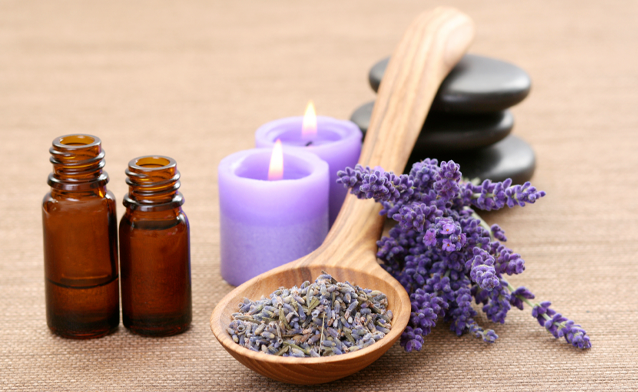
In addition to linalool, compounds like limonene, geraniol and beta-caryophyllene give lavender oil its anti-inflammatory and soothing effects. Also, the lavender essential oil has been shown to provide temporary pain relief and reduce the perception of pain. Interestingly, one study on rats showed that lavender essential oil has effects on pain reduction similar to drugs like tramadol, an opioid, without the same side effects of long-term use.
Besides using antibacterial textiles for your bedroom, you can also add a drop of lavender oil to soothe your skin while also protecting it from intruders.
Eucalyptus Essential Oil
Eucalyptus oil is such a champ when it comes to repelling mosquitos, even the Centers for Disease Control and Prevention (CDC) have its back. In fact, there are several studies supporting the claim that eucalyptus can be used as a natural mosquito repellent.
One study tested and proved the repelling activities of 3 species of eucalyptus (E. staigeriana, E. citriodora, and E. globulus) against the blood-sucking sandfly litozomya. Another study showed that a mixture of 32% lemon eucalyptus oil provided more than 95 % protection against mosquitoes for 3 hours.
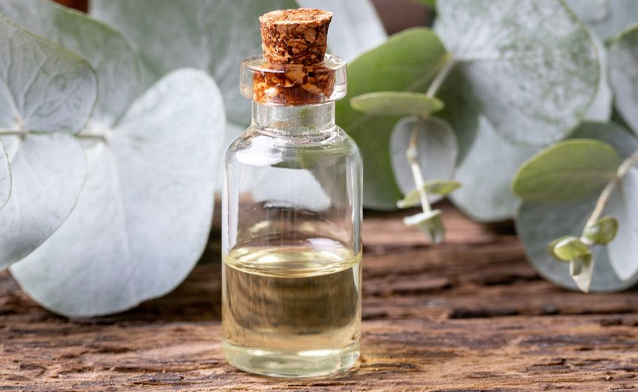
In addition to repelling bugs, you can use eucalyptus oil to relieve a cough and clear up your chest. This might not be that unfamiliar to you if you’ve ever used Vicks VapoRub. But even before there were mixtures of eucalyptus oil and modern cough medications, eucalyptus leaves were used to treat more than just respiratory diseases. The Australian aborigines, for example, treated wounds with eucalyptus to prevent infections.
Tea Tree Essential Oil
Tea tree oil comes from the leaves of Melaleuca Alternifolia. This small tree native to Queensland and New South Wales, Australia shouldn’t be confused with other tea plants that we used for making green, black teas etc.
It’s been used as traditional medicine by native Australian Aborigines for centuries. The tea tree leaves are crushed to extract the oil. Next, it’s inhaled to treat coughs and colds or applied directly to the skin for healing.
A study testing its bug-repelling activity found that 24 hours after being treated with tea tree oil, cows had 61% fewer flies than cows that weren’t treated. Moreover, another study revealed that tea tree oil could even repel mosquitoes more than DEET, the infamous yet incredibly efficient insect repellent.
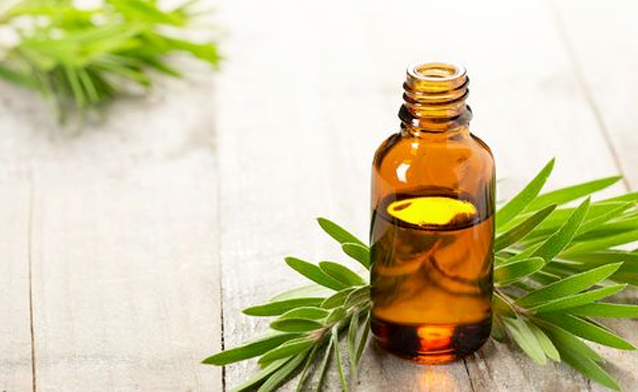
Last but not least, tea tree oil contains a number of compounds that not only kill certain bacteria, viruses and fungi but also increase the activity of your white blood cells to help you fight the foreign invaders that still managed to find their way in.
Sandalwood Essential Oil
The Santalum genus woods are heavy, yellow, fine-grained and keep the fragrance for decades, unlike other aromatic trees. This enchanting fragrance comes from its loins and, when extracted, sandalwood oil is the product.
Made from 100% renewable sources, sandalwood and its oil are proficient at keeping all kinds of bugs away, especially mosquitos. In fact, a pair of burning mosquito sticks with sandalwood oil was compared to a DEET-based control and they were both 100% effective in keeping the mosquitoes away for 3 hours.

Sandalwood oil walks arm in arm with leading chemical brands when it comes to its efficiency (protection time and biting percentage) but it’s light years ahead when it comes to safety and overall value. This essential oil can also fight bacteria, promote wound healing, aid in the fight against skin cancer and even manage anxiety.
Moreover, out of 20 essential oils tested for repellent activity against the two-spotted spider mite T. urticae in the choice tests. In subsequent no-choice tests using these 20 essential oils, only sandalwood oil kicked them to the curb.
To Sum Up
Don’t take mosquito season lightly. After all, they do represent one of the most significant threats to human and veterinary health and are one of the deadliest animals in the world. In fact, their ability to carry and spread diseases to humans is responsible for millions of deaths each year, or to be more specific, 700,000,000 deaths per year worldwide. There are ways we can prevent disease away and just by using natural oils that repel mosquitoes effectively but also by maintaining overall health to fight off disease and infection.



